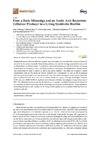Identificador persistente para citar o vincular este elemento:
https://accedacris.ulpgc.es/jspui/handle/10553/58368
| Título: | From a Basic Microalga and an Acetic Acid Bacterium Cellulose Producer to a Living Symbiotic Biofilm | Autores/as: | Nobrega, Vitor Faria, Marisa Martel Quintana, Antera Kaufmann, Manfred Ferreira, Artur Cordeiro, Nereida |
Clasificación UNESCO: | 241707 Algología (ficología) | Palabras clave: | Bacterial cellulose Microalgae Living biofilm Chlamydomonas debaryana Komagataeibacter saccharivorans, et al. |
Fecha de publicación: | 2019 | Publicación seriada: | Materials | Resumen: | Bacterial cellulose (BC) has recently been the subject of a considerable amount of research, not only for its environmentally friendly biosynthesis, but also for its high potential in areas such as biomedicine or biomaterials. A symbiotic relationship between a photosynthetic microalga, Chlamydomonas debaryana, and a cellulose producer bacterium, Komagataeibacter saccharivorans, was established in order to obtain a viable and active biofilm. The effect of the growth media composition ratio on the produced living material was investigated, as well as the microalgae biomass quantity, temperature, and incubation time. The optimal temperature for higher symbiotic biofilm production was 30 degrees C with an incubation period of 14 days. The high microalgae presence, 0.75% w/v, and 60:40 HS:BG-11 medium (v/v) induced a biofilm microalgae incorporation rate of 85%. The obtained results report, for the first time, a successful symbiotic interaction developed in situ between an alkaline photosynthetic microalga and an acetic acid bacterium. These results are promising and open a new window to BC living biofilm applications in medical fields that have not yet been explored. | URI: | https://accedacris.ulpgc.es/handle/10553/58368 | ISSN: | 1996-1944 | DOI: | 10.3390/ma12142275 | Fuente: | Materials [ISSN 1996-1944], v. 12 (14) |
| Colección: | Artículos |
Citas SCOPUSTM
7
actualizado el 08-jun-2025
Citas de WEB OF SCIENCETM
Citations
7
actualizado el 15-feb-2026
Visitas
267
actualizado el 16-ene-2026
Descargas
132
actualizado el 16-ene-2026
Google ScholarTM
Verifica
Altmetric
Comparte
Exporta metadatos
Los elementos en ULPGC accedaCRIS están protegidos por derechos de autor con todos los derechos reservados, a menos que se indique lo contrario.
